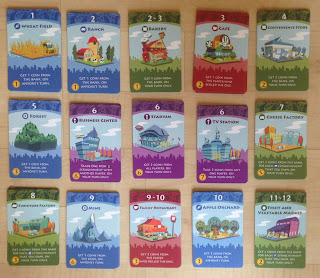Designer: Masao Suganuma
Manufacturer: IDW Games &Pandasaurus
Year: 2012 (?)
"I remember when
all this was wheat fields, we would get up at the break of dawn, farm all day
then go to sleep. Back then you'd take your wheat to the bakery, the only one
in town, and they'd give you back some bread, and if you were lucky maybe an
iced bun! Of course these days you young'uns are spoilt with your shopping mall
and your amusement park, bah, no respect for the simple things in life! Of
course when I was older they set me to work in the mines you know, that's when
things really started changing around here. We stuck gold one day, figuratively
speaking of course, and since then this town has been richer than you can
imagine. Did I tell you about when this was all wheat fields?"
"Yes Grampa, that
was 30 minutes ago"
 Machi Koro is a fast paced card and dice game where you try
to improve your cities to make the most of dice rolls while, if at all
possible, hindering your opponent. Each turn you will roll the die (or both die
later in the game), activate the relevant buildings, and then spend your
hard-earned money on new constructions. The new constructions generally make
dice rolls more profitable which in turn leads to more money and better
buildings. Keep going until you have built the best town of all.
Machi Koro is a fast paced card and dice game where you try
to improve your cities to make the most of dice rolls while, if at all
possible, hindering your opponent. Each turn you will roll the die (or both die
later in the game), activate the relevant buildings, and then spend your
hard-earned money on new constructions. The new constructions generally make
dice rolls more profitable which in turn leads to more money and better
buildings. Keep going until you have built the best town of all.
Every building has an effect printed in text at the bottom
of it, a cost to buy and a dice roll that will activate it. Early on in the
game players will be playing with 1 dice so all numbers 1-6 are equally good,
but later on when 2 dice start coming into play then cards that activate on a 1
suddenly look less appealing. You'll pay a premium for the cards that can only
activate on 2 dice, but then can often have powerful effects. Ultimately you
need to buy the 4 special buildings that each player starts with a copy to
construct, each building gives you a power once built (the cheapest one allows
you to roll both dice if you want to)
and the first player to build all 4 wins.
Cards come in 4 varieties; Cards that activate on
anyone's roll, which generally earn you less money. Cards that activate on only
your rolls, but reward you with more money. Cards that activate only
on opponent rolls and usually involve stealing the roller's money. Finally
there are the Special Buildings which generally unlock a new power (such as an
extra turn on doubles). Some cards activate on 2 numbers which can help balance
out their otherwise low power.
 |
| The 15 main cards that you can buy during the game, more common rolls will tend to cost you more money. |
 |
| The 4 cards you need to build to win the game, these have special powers once built which can help exacerbate the runaway leader problem. |
The game also has a strong tendency to reward one player
above all others, get lucky once and you can afford better buildings, which
means you get lucky more, which means you buy more buildings, which means you
get lucky more, which means you win. Perhaps this would be less pronounced in a
4 player game, but certainly the 2-player variant feels very skewed. If you
want a game for ~8 year olds, who are ready to go beyond childhood games and
start thinking about strategy then perhaps this game is the game for you, but I
don't think I could in good conscience recommend this to an adult gaming group.
The painful thing is I feel that there is a good game in here waiting to break
free, but they just didn't get it right.
4/10

From what I have heard, adding the Harbor expansion really improves the game play.
ReplyDeleteI've not tried the expansion, and it may be the case, but I'm a little wary of the idea of buying an expansion for a game that I don't think is that good.There are too many games that start off good and then have great expansions to spend money
ReplyDelete